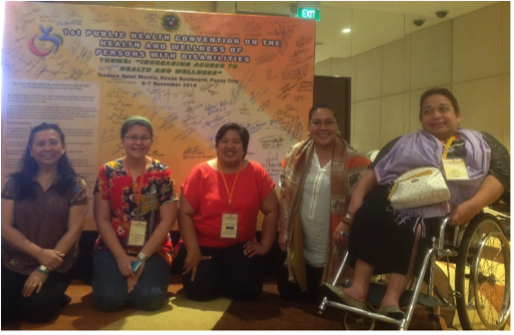Speech-Language Pathology (SLP) in the country has been oriented to target individual clients and their families. However, a vast majority of Filipinos needing health and social services cannot afford to do so. The national and local government has recognized that most persons with disabilities and their families are included in this marginalized group thus necessitating the need to develop more public policies and programs targeting to serve their needs.
Recent international laws and treaties, like the United Nations Convention on the Human Rights of Persons with Disabilities and the Incheon Strategies to Make the Right Real, were signed by the Philippine Government and is reflected in their call to action as the third Asia-Pacific Decade on Persons with Disabilities was launched last year. They recognized that certain adjustments should be made to ensure persons with disabilities are able to participate and avail social services and programs.
Health programs are being reviewed to ensure that EVERYONE including persons with disabilities have access to affordable and quality health care. Training of new trainors for community-based rehabilitation programs initiated by regional Department of Health (DOH) centers were done. It was emphasized during the training that SLP professionals are committed to building the nation thus are open to partnerships to support local government efforts to provide services such as public education on communication and feeding disabilities as well as direct service provision.
 DOH has launched its campaign to encourage the development of wellness programs for persons with disabilities. Last November 6-7, the First Public Health Convention on Health and Wellness for Persons with Disabilities was held at the Trader’s Hotel, Manila. Speakers were emphasizing the need for better data gathering to ensure that there is systematic collection of data that would reflect the incidence and prevalence of persons with disabilities for each type to assist the government in planning policies and programs that would generally serve their needs.
DOH has launched its campaign to encourage the development of wellness programs for persons with disabilities. Last November 6-7, the First Public Health Convention on Health and Wellness for Persons with Disabilities was held at the Trader’s Hotel, Manila. Speakers were emphasizing the need for better data gathering to ensure that there is systematic collection of data that would reflect the incidence and prevalence of persons with disabilities for each type to assist the government in planning policies and programs that would generally serve their needs.
Another upcoming government program which can potentially engage and recognize practicing speech-language pathologists working at PHILHEALTH-accredited centers is the expanded Z-MORPH package of assistive devices. Three subprograms are being proposed under this package and these are the wheelchair provision program, hearing aid provision program and visually impaired devices program. Lobbying efforts are still being done to ensure that there will be post-device fitting training, rehabilitation and other after-care services are also provided by PHILHEALTH to maximize the benefits of having these assistive devices.
The abovementioned movement by government agencies as well as efforts of non-government organizations are complementing endeavors towards supporting the call of persons with disabilities to include them in development efforts. We, speech-language pathologists, are also being asked by the person with disabilities sector to heed the call to build capacities of Filipinos with communication and feeding disabilities through various means. It is with fervent hope that we will able to help develop their voices so that they themselves can communicate what they need and what. In the next five years, we hope that more SLPs would work with individuals, families and groups towards true inclusive development.